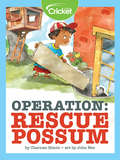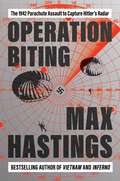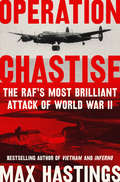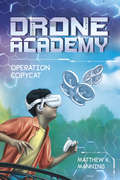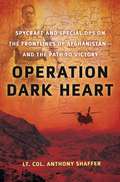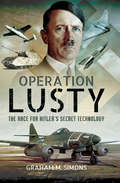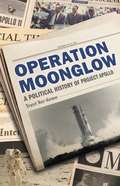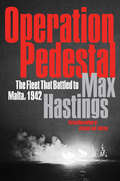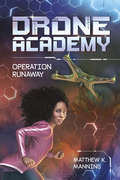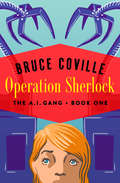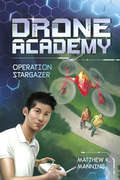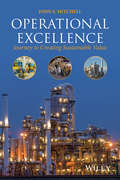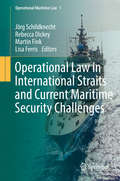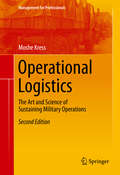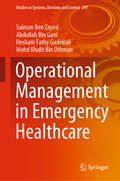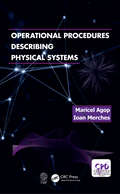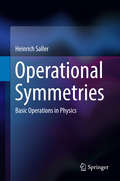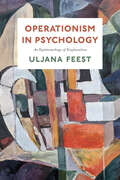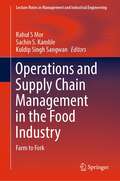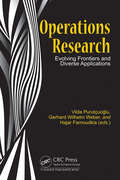- Table View
- List View
Operation: Rescue Possum
by Charnan SimonJakey's brothers have an elaborate plan for rescuing a trapped possum, but Jakey finds a much simpler solution.
Operation: Unlocking Earth's Geologic Mysteries
by The JASON ProjectDeveloped by JASON Learning - in partnership with the National Geographic Society, NOAA, the Smithsonian Institution, and the U.S. Department of Energy - Geology: Tectonic Fury takes students on a journey to examine the geologic forces at work on our planet. Students work alongside leading researchers to investigate Earth's icy peaks, liquid metal core, and strange and beautiful landforms. Geology affects so many aspects of our lives, from energy production to the food we grow. Understanding the structure of Earth, its history, and the processes that act on is vital for our survival. Geology: Tectonic Fury explains key concepts related to geology - including rocks and minerals, the rock cycle, weathering and erosion, soil, Earth's history, fossils, plate tectonics, earthquakes, and volcanoes - in an engaging and exciting format. With 134 pages of breathtaking, full-color images, Geology: Tectonic Fury is sure to captivate curious minds. JASON Learning curricula are designed to be incorporated into upper elementary, middle school, and high school classrooms and other formal and informal learning environments. Content is rigorously aligned to national and state science standards as well as Common Core mathematics and English language arts standards. In addition to the engaging reading selections and integration of real-world scientists and their work, all JASON curricula include hands-on activities and labs that can be performed easily with limited resources. Optional JASON Online Access (purchased separately) brings content to life with a host of additional features on JASON's gated website including read-to-me functionality, scientist profiles, on-demand videos, and award-winning interactive games.
Operation and Control of Renewable Energy Systems
by Mukhtar AhmadA comprehensive reference to renewable energy technologies with a focus on power generation and integration into power systems This book addresses the generation of energy (primarily electrical) through various renewable sources. It discusses solar and wind power—two major resources that are now in use in small as well as large-scale power production—and their requirements for effectively using advanced control techniques.In addition, the book looks at theintegration of renewable energy in the power grid and its ability to work in a micro grid. Operation and Control of Renewable Energy Systems describes the numerous types of renewable energy sources available and the basic principles involving energy conversion, including the theory of fluid mechanics and the laws of thermodynamics. Chapter coverage includes the theory of power electronics and various electric power generators, grid scale energy storage systems, photovoltaic power generation, solar thermal energy conversion technology, horizontal and vertical wind turbines for power generation, and more. Covers integration into power systems with an emphasis on microgrids Introduces a wide range of subjects related to renewable energy systems, including energy storage, microgrids, and battery technologies Includes tutorial materials such as up-to-date references for wind energy, grid connection, and power electronics—plus worked examples and solutions Operation and Control of Renewable Energy Systems is the perfect introduction to renewable energy technologies for undergraduate and graduate students and can also be very useful to practicing engineers.
Operation Biting: The 1942 Parachute Assault to Capture Hitler's Radar
by Max HastingsIn this enthralling history, internationally bestselling author Max Hastings recounts the odds-defying Operation Biting, a 1942 parachute commando raid on Northern France to steal vital components of German intelligence—one of the most thrilling British commando raids of World War II, and one of the most successful. In February 1942, RAF intelligence was baffled by a newly identified radar network on the coast of Nazi-occupied Europe, codenamed Würzburg. British intelligence proposed an assault to capture key components. Incredibly brave agents of the French Resistance risked their lives to probe the German defenses on the Normandy coast. Then a company of Airborne forces were dropped into France in the dead of night amid heavy snow. Launching their attack, the allied soldiers dismantled the German’s radar, and after three nail-biting hours and a fierce battle with Wehrmacht defenders, escaped in the nick of time using landing-craft that carried them back across the stormy seas to Portsmouth.Operation Biting retells this dramatic operation through a gallery of amazing characters from Winston Churchill, who promoted the raid, to Lord Mountbatten, who commanded Combined Operations, to the brave unsung commandos who fought their way through enemy territory.A cliffhanger of a story that ratchets the suspense to the last page, Operation Biting sheds new light on an exciting and little-known chapter of the Second World War.
Operation Chastise: The RAF's Most Brilliant Attack of World War II
by Max HastingsOne of the most lauded historians of our time returns to the Second World War in this magnificent retelling of the awe-inspiring raid on German dams conducted by the Royal Army Force’s 617 Squadron.The attack on Nazi Germany’s dams on May 17, 1943, was one of the most remarkable feats in military history. The absurdly young men of the Royal Air Force’s 617 Squadron set forth in cold blood and darkness, without benefit of electronic aids, to fly lumbering heavy bombers straight and level towards a target at a height above the water less than the length of a bowling alley. Yet this story—and the later wartime experience of the 617 Squadron—has never been told in full. Max Hastings takes us back to the May 1943 raid to reveal how the truth of that night is considerably different from the popularized account most people know. The RAF had identified the Ruhr dams as strategic objectives as far back as 1938; in those five years Wing Commander Guy Gibson formed and trained the 617 Squadron. Hastings observes that while the dropping of Wallis’s mines provided the dramatic climax, only two of the eight aircraft lost came down over the dams—the rest were shot down on the flight to, or back from, the mission. And while the 617 Squadron’s valor is indisputable, the ultimate industrial damage caused by the dam raid was actually rather modest. In 1943, these brave men caught the imagination of the world and uplifted the weary spirits of the British people. Their achievement unnerved the Nazi high command, and caused them to expend large resources on dam defenses—making the mission a success. An example of Churchill’s “military theatre” at its best, what 617 Squadron did was an extraordinary and heroic achievement, and a triumph of British ingenuity and technology—a story to be told for generations to come.Operation Chastise includes three 8-page black-and-white photo inserts and 6 maps.
Operation Copycat (Drone Academy)
by Matthew K. ManningGrowing up with financial worries and only a single dad looking out for him, Sai Patel found escape on the Internet. And as a founding member of Drone Academy, Sai takes every opportunity to stand up for underdogs being cyber-bullied. But after ousting a particularly nasty bully from the SWARM boards, Sai's life takes a dramatic turn when his nemesis customizes a drone to look exactly like Sai's, using it to commit theft, interrupt emergency rescues, and cause as much trouble as possible. Framed for crimes he didn't commit, Sai must prove his innocence to his friends and the law, using his own drone to bring its doppelganger to justice.
Operation Dark Heart: Spycraft and Special Ops on the Frontlines of Afghanistan -- and the Path to Victory
by Anthony ShafferOn Friday, August 13, 2010, just as St. Martin's Press was readying its initial shipment of this book, the Department of Defense contacted us to express its concern that our publication of Operation Dark Heart could cause damage to U.S. national security. After consulting with our author, we agreed to incorporate some of the government's changes into a revised edition of his book while redacting other text he was told was classified. The newly revised book keeps our national interests secure, but this highly qualified warrior's story is still intact; Shaffer's assessment of successes and failures in Afghanistan remains dramatic, shocking, and crucial reading for anyone concerned about the outcome of the war. While I do not agree with the edits in many ways, the DoD redactions enhance; the reader's understanding by drawing attention to; the flawed results created by a disorganized and heavy handed military intelligence bureaucracy. Lt. Col. Anthony Shaffer had run intelligence operations for years before he arrived in Afghanistan. He was part of the; dark side of the force;---the shadowy elements of the U.S. government that function outside the bounds of the normal system. His group called themselves the Jedi Knights and pledged to use the dark arts of espionage to protect the country from its enemies. Shaffer's mission to Afghanistan, however, was unlike any he had ever experienced before. There, he led a black-ops team on the forefront of the military efforts to block the Taliban's resurgence. They not only planned complex intelligence operations to beat back the insurgents, but also played a key role in executing those operations---outside the wire. They succeeded in striking at the core of the Taliban and their safe havens across the border in Pakistan. For a moment Shaffer saw us winning the war. Then the military brass got involved. The policies that top officials relied on were hopelessly flawed. Shaffer and his team were forced to sit and watch as the insurgency grew---just across the border in Pakistan. This wasn't the first time he had seen bureaucracy stand in the way of national security. He had participated in Able Danger, the aborted intelligence operation that identified many of the future 9/11 terrorists but failed to pursue them. His attempt to reveal the truth to the 9/11 Commission would not go over well with his higher-ups. Operation Dark Heart tells the story of what really went on--and what went wrong--in Afghanistan. Shaffer witnessed firsthand the tipping point, when what seemed like certain victory turned into failure. Now, in this book, he maps out a way that could put us on the path to winning the war.
Operation Lusty: The Race for Hitler's Secret Technology
by Graham M. SimonsA fascinating overview of the Allies&’ post-WWII program to gain access to advanced Nazi war machines and the technology they ultimately recovered. Prior to the Allied D-Day assault on Normandy, France, rumors had already been circulating that high-tech Nazi super-weapons (wunderwaffe) had reached or were near completion. At the war&’s end, a mad scramble ensued to discover the enemy&’s secrets, fueled in large part by a US desire to regain its technological edge and to keep these weapons out of Soviet hands. Operation Lusty (LUftwaffe Secret TechnologY) was in full swing. In Operation Lusty, aviation historian Graham M. Simons delivers a comprehensive and detailed history of the program while cataloging the advanced war equipment that was ultimately discovered—from U-boats, carriers, and battleships to radar equipment and operating systems, to fighters, bombers, rockets, and other V-weapons. With access to previously unreleased documentation and wide-ranging archival materials, Simons distinguishes what was fact in the Nazi arsenal from what was pure fantasy, dreamed up by Joseph Goebbels&’s powerful propaganda machine. Operation Lusty sheds new light on the furious race for postwar technological superiority, and offers an insider&’s look at the full spectrum of military spoils that were gained.
Operation Moonglow: A Political History of Project Apollo
by Teasel Muir-HarmonyThe moon landing was an important moment in history, but many forget what was happening behind the scenes -- discover the groundbreaking political history of the Apollo program in this riveting exploration of America's space missions.Since July 1969, Neil Armstrong's first step on the Moon has represented the pinnacle of American space exploration and a grand scientific achievement. Yet, as Smithsonian curator Teasel Muir-Harmony argues in Operation Moonglow, its primary purpose wasn't advancing science. Rather, it was part of a political strategy to build a global coalition. Starting with President John F. Kennedy's 1961 decision to send astronauts to the Moon to promote American "freedom" over Soviet "tyranny," Project Apollo was central to American foreign relations. From that perspective, the critical event did not just take place on the lunar surface, it took place in homes, public squares, palaces, and schools around the world, as Apollo captured global attention like never before. After the Moon landing, the Apollo astronauts and President Richard Nixon traveled the world to amplify the sense of participation and global unity shared by billions of people who followed the flight.Drawing on a rich array of untapped archives and firsthand interviews with Apollo astronauts, Operation Moonglow paints a riveting picture of the intersection of spaceflight, geopolitics, propaganda, and diplomacy during the Cold War.
Operation Pedestal: The Fleet That Battled to Malta, 1942
by Max HastingsRenowned historian Max Hastings recreates one of the most thrilling events of World War II: Operation Pedestal, the British action to save its troops from starvation on Malta—an action-packed tale of courage, fortitude, loss, and triumph against all odds.In 1940, Hitler had two choices when it came to the Mediterranean region: stay out, or commit sufficient forces to expel the British from the Middle East. Against his generals’ advice, the Fuhrer committed a major strategic blunder. He ordered the Wehrmacht to seize Crete, allowing the longtime British bastion of Malta to remain in Allied hands. Over the fall of 1941, the Royal Navy and RAF, aided by British intelligence, used the island to launch a punishing campaign against the Germans, sinking more than 75 percent of their supply ships destined for North Africa.But by spring 1942, the British lost their advantage. In April and May, the Luftwaffe dropped more bombs on Malta than London received in the blitz. A succession of British attempts to supply and reinforce the island by convoy during the spring and summer of 1942 failed. British submarines and surface warships were withdrawn, and the remaining forces were on the brink of starvation.Operation Pedestal chronicles the ensuing British mission to save those troops. Over twelve days in August, German and Italian forces faced off against British air and naval fleets in one of the fiercest battles of the war, while ships packed with supplies were painstakingly divided and dispersed. In the end only a handful of the Allied ships made it, most important among them the SS Ohio, carrying the much-needed fuel to the men on Malta.As Hastings makes clear, while the Germans claimed victory, it was the British who ultimately prevailed, for Malta remained a crucial asset that helped lead to the Nazis’ eventual defeat. While the Royal Navy never again attempted an operation on such scale, Hasting argues that without that August convoy the British on Malta would not have survived. In the cruel accountancy of war, the price was worth paying.
Operation, Planning, and Analysis of Energy Storage Systems in Smart Energy Hubs
by Behnam Mohammadi-Ivatloo Farkhondeh JabariThis book discusses the design and scheduling of residential, industrial, and commercial energy hubs, and their integration into energy storage technologies and renewable energy sources. Each chapter provides theoretical background and application examples for specific power systems including, solar, wind, geothermal, air and hydro. Case-studies are included to provide engineers, researchers, and students with the most modern technical and intelligent approaches to solving power and energy integration problems with special attention given to the environmental and economic aspects of energy storage systems.
Operation Runaway (Drone Academy)
by Matthew K. ManningDespite the fact that she's a founding member of Drone Academy, Zora Michaels is viewed as a flighty girly-girl by the other kids at her high school. Masking her genius-level intellect with the latest clothing trends and her popular group of friends, Zora's real passion lies behind her keyboard. But when the younger brother of one of the school's least popular students goes missing, Zora begins to search for the runaway using her tough-as-nails drone. Things get complicated when a nearby forest fire endangers the boy's life. Zora must coordinate with local firefighters to locate and rescue the runaway, all while keeping her identity a secret from her increasingly nosy peers.
Operation Sherlock
by Bruce CovilleOn an island of geniuses, a gang of kids must use their smarts to survive When five brilliant but wacky friends get dragged to a deserted island by their scientist parents, they decide to do what any self-respecting young brainiacs would: beat the adults at their own game. The only problem is, before the group can discover whether artificial intelligence is an impossible dream or the solution to mankind's problems, they'll first have to save themselves from a horrifying death trap--and the entire island from destruction at the hands of a mad bomber! This ebook features an illustrated personal history of Bruce Coville including rare images from the author's collection.
Operation Stargazer (Drone Academy)
by Matthew K. ManningWhile Howard To has always been on the geeky side, there's one girl who brings him out of his shell. Unfortunately, she's Hollywood's hottest sci-fi star and about as likely to cross Howard's path as he is likely to be struck by lightning. But when the starlet is hounded by a stalker who uses a drone to spy on her private life, Howard sees his chance to be a knight in shining armor. He employs his own drone to engage in aerial combat with the stalker's UAV, despite complaints from Parker, a fellow Drone Academy member. In the process, Howard also realizes his chance at romance may be closer to home than he realizes. . . .
Operational and Environmental Consequences of Large Industrial Cooling Water Systems
by Henk A. Jenner Vayalam P. Venugopalan Sanjeevi RajagopalThe use of water for industrial purposes is of foremost importance. It is used as a coolant and industrial activities dealing with power generation, steel and iron, paper and pulp and oil require very large amounts of water. The industry, therefore, resorts to large scale abstraction of water from natural water bodies. This water is often treated with chemicals to combat operational problems like biofouling and corrosion. Such withdrawal and subsequent discharge of large amounts of water have the potential to impart significant impact on the recipient water body. The organisms drawn along with the cooling water, as well as those residing at the discharge zone, are subjected to a combination of mechanical, thermal and chemical stress on a continuous basis.
Operational Excellence
by John S. MitchellProvides the foundation and tools that are essential for an enterprise to bring Operational Excellence into their organizational culture; gain maximum results, benefits and value Strategies for and implementing details for enterprises at all levels of maturity from those with programs in place to those looking to improve safety, health, environment performance as well as the efficiency and effectiveness of their operations Includes topics from concept to sustainability satisfying knowledge requirements of all levels in the organization Defines program objectives; develops improvement strategies; identifies and prioritizes improvement opportunities; implements improvement plans; monitors, continuously improves and sustains results Applicable to a broad variety of operating enterprises, academic institutions and third party implementing organizations
Operational Law in International Straits and Current Maritime Security Challenges (Operational Maritime Law Ser. #1)
by Lisa Ferris Martin Fink Rebecca Dickey Jörg SchildknechtThis book addresses a wide range of contemporary operational maritime law issues across the spectrum of operations. It provides sophisticated analyses and insights, and offers new interpretations of topics that are directly relevant for contemporary naval operations.The book examines unresolved legal issues in order to provide guidelines for conducting maritime operations, and also offers reference material for general education on the law of naval operations. Further, it serves as a comprehensive resource for operational doctrine and military planning, and presents an approach to dealing with multiple legal issues that demonstrates how modern military operations at sea can legally be executed. Focusing on operational and tactical topics, it is a valuable addition to the bookshelves of military lawyers and operators alike.
Operational Logistics
by Moshe KressThis book explores the theoretical foundations and applications of military operational logistics (OpLog). OpLog theory has two facets: qualitative and quantitative. The qualitative facet is imbedded in the theory of operational level of war or operational art. It includes principles, imperatives and tenets, which are stated and analyzed in the first few chapters. The quantitative facet relates to the scientific aspects of OpLog. It is manifested by formal network models representing structural and operational features of an OpLog system. The book examines the two facets and integrates them into a unified presentation. Important OpLog applications a re described and discussed. Chapter 1 presents a general introduction to military logistics. Chapter 2 discusses the px;font-family: monospace;">general structure and characteristics of logistics and describes its three levels - strategic, operational and tactical. Chapter 3 describes the foundation of OpLog. Chapter 4 deals with OpLog planning. Chapter 5 addresses the issue of logistic information, and Chapter 6 deals with forecasting logistic demands. Chapters 7 and 8 are new additions to this second edition. They address logistics aspects of two contemporary operational topics - insurgencies and humanitarian assistance. Chapter 9 describes the first version of the logistic network model. Chapter 10 addresses an important OpLog characteristic - Flexibility. Chapter 11 discusses two major challenges in OpLog practice: force accumulation, 4419px; font-family: monospace;">and medical treatment and evacuation. Chapter 12 presents an inter-temporal network optimization model designed to determine deployment and employment of 3333px;font-family: monospace;">the OpLog support chain during military operations.
Operational Management in Emergency Healthcare (Studies in Systems, Decision and Control #297)
by Salman Ben Zayed Abdullah Bin Gani Hesham Fathy Gadelrab Mohd Khalit Bin OthmanThis book presents a systematic review of research concerning processes and systems in Emergency Departments (EDs), the issues faced by EDs, and their solutions to ensure the delivery of proper and ideal healthcare services for patients through superior quality process management. The book evaluates two decades of data, from 2000 to 2019, in order to examine the processes used in ED operations.
Operational Procedures Describing Physical Systems
by Marciel Agop Ioan MerchesThe authors examine topics in modern physics and offer a unitary and original treatment of the fundamental problems of the dynamics of physical systems, as well as a description of the nuclear matter within a framework of general relativity. They show that some physical phenomena studied at two different resolution scales (e.g. microscale, cosmological scale), apparently with no connection between them, become compatible by means of the operational procedures, acting either as some ”hidden” symmetries, or harmonic-type mappings. The book is addressed to the students, researchers and university/high school teachers working in the fields of mathematics, physics, and chemistry.
Operational Symmetries
by Heinrich SallerThis book describes the endeavour to relate the particle spectrum with representations of operational electroweak spacetime, in analogy to the atomic spectrum as characterizing representations of hyperbolic space. The spectrum of hyperbolic position space explains the properties of the nonrelativistic atoms; the spectrum of electroweak spacetime is hoped to explain those of the basic interactions and elementary particles. In this book, the theory of operational symmetries is developed from the numbers, from Plato's and Kepler's symmetries over the simple Lie groups to their applications in nonrelativistic, special relativistic and general relativistic quantum theories with the atomic spectrum for hyperbolic position and, in first attempts, the particle spectrum for electroweak spacetime. The standard model of elementary particles and interactions is characterized by a symmetry group. In general, as initiated by Weyl and stressed by Heisenberg, quantum theory can be built as a theory of operation groups and their unitary representations. In such a framework, time, position and spacetime is modeled by equivalence classes of symmetry groups. For a unification on this road, the quest is not for a final theory with a basic equation for basic particles, but for the basic operation group and its representations.
Operationism in Psychology: An Epistemology of Exploration
by Uljana FeestAnalyzes psychological research to offer insights into how methodological and ontological questions are intertwined. Psychology has seen an intense debate about the lack of replicability of results in recent years. Uljana Feest uses history and philosophy of science to shed light on the nature of experiment in psychology in general, but her aim reaches beyond debates about replication to provide a novel and comprehensive analysis of the investigative process in experimental psychology. She shows that the central unit of analysis for our epistemological considerations of psychological research should be not theories but, rather, concepts. Her guiding question is: How do psychological concepts figure in the experimental exploration of the objects of psychological research? For Feest, this question has two intertwined aspects: What role do concepts play in the design of experiments and the production of data, and how can concepts be revised or adapted in response to experimental results. Following the historical trajectory of debates about operationism in psychology, she argues that this debate was not concerned with philosophical theories of meaning but, instead, closely connected to the investigative practices of experimental psychologists. The book offers a broad analytical framework for thinking philosophically about the investigative process in psychology, including analyses of the relationship between data and phenomena in psychology, the relationship between folk- and scientific psychological concepts, the relationship between genuine results and experimental artifacts, and the nature and exploration of psychological kinds.
Operations and Supply Chain Management in the Food Industry: Farm to Fork (Lecture Notes in Management and Industrial Engineering)
by Kuldip Singh Sangwan Rahul S Mor Sachin S. KambleThis book offers effective and competitive food supply chains that are the consequence of technological innovation, collaboration, small agri-food business cases, entrepreneurial opportunities, cold chain technology management, disruptive technologies, and performance assessment through empirical analysis, case studies, and multimethod research in the food industry. The book comprehensively covers different interfaces of the food supply chain including procurement, processing, distribution, consumer, i.e., farm to fork. It provides solutions to various challenges such as globalization, food recalls, technological innovations, and consumer trust. This book will be of interest to researchers in the areas of the food supply chain, operations management, industrial engineering as well as professionals in the agri-food and allied industry.
Operations Management for Environmental Sustainability: Operational Measures, Regulations and Carbon Constrained Decisions (SpringerBriefs in Operations Management)
by Guowei Dou Lijun Ma Kun Wei Qingyu ZhangThis book explores optimal decisions for companies and governments to build a sustainable supply chain and economy by applying analytical models from new perspectives. Taking differentiated carbon permit-buying and -selling prices into consideration, it investigates the optimal emission permit cap under the “cap-and-trade” regulation and discusses how to establish a two-period carbon tax scheme with a two-period planning horizon. Moreover, it examines how to balance the economic and environmental performances in a closed-loop supply chain, how to implement trade-in program when employing green technologies, and how to strategically use the blockchain technology to improve the environmental performance of supply chain under the carbon tax policy. This book is written for students and researchers who are specialized in the field of operations management with a focus on environmental sustainability. It is also beneficial for specialists and executives at companies that are facing carbon emission regulation challenges, as well as government officials who develop the emission control policies.
Operations Research: Evolving Frontiers and Diverse Applications
by Vilda Purutçuoğlu Gerhard Wilhelm Weber Hajar FarnoudkiaOperational research (OR) methods are used in many fields of sciences like computer engineering, industrial engineering, social works, business management, medical studies and finance. This book, is the second book in the series of Operational Research (OR) books. It brings together the latest advances of these methods written by experts from all over the world. The book comprises 13 chapters and is split into four main parts, i.e., OR in supply chain management, OR in production planning and inventory management, OR in signal processing and OR in social sciences. The book contains recent methodologies and comprehensive reviews where necessary, so that readers can follow up to date progress in the field while observing various applications with large datasets. The data used in the book is available in public databases. Therefore, the reader can easily access them and try their own approaches for comparison. Furthermore, since the book covers the literature reviews in each chapter, readers can both follow other benchmark techniques in the field and learn the theoretical aspects of the selected methods. In conclusion, the book will be assist in the discovery of new avenues for novel researchers who are interested in OR methods.
